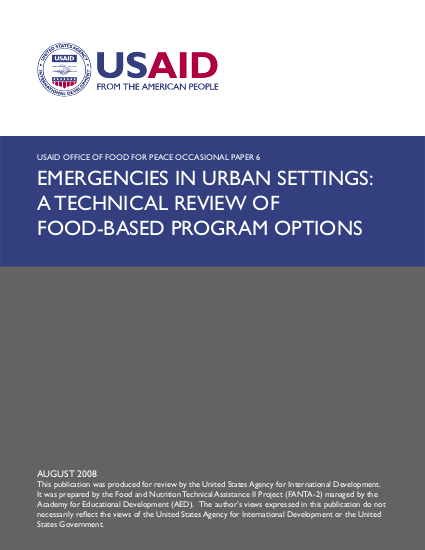
The objective of this paper is to provide technical information and lessons learned to support the United States Agency for International Development (USAID) and its partners to effectively design and implement emergency food assistance programs in urban and peri-urban settings. Although the majority of the world’s food insecure population will continue to reside in rural areas for the foreseeable future, given global urbanization trends and the vulnerability of low-income urban populations to market-induced food security shocks, urban humanitarian interventions may require increasing levels of resources in the coming years. The USAID Office of Food for Peace (FFP) food assistance programs have traditionally focused largely on rural areas, offering a large body of literature on best practices. Similar information on urban food assistance programming has been limited, particularly in emergencies. This paper draws from available experience to highlight lessons learned for humanitarian agencies that have determined, based on a comprehensive assessment on the ground, that food is a necessary and appropriate resource to use in an emergency response. This paper intends to serve as a useful reference for those designing food-based responses in urban emergencies.
Resource collections
- Evaluating humanitarian action
- Monitoring and Evaluation (M&E)
- Monitoring of humanitarian action
- UN Habitat - Urban Response Collection
- Urban Response - Urban Crisis Preparedness and Risk Reduction
- Urban Response Collection - Community Engagement and Social Cohesion
- Urban Response Collection - Economic Recovery
- Urban Response Collection - Environment and Climate Change
- Urban Response Collection - Housing, Land and Property
- Urban Response Collection - Urban Crisis Response, Recovery and Reconstruction
- Urban Response Collection - Urban Resilience